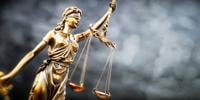
Lady Justice
PHILADELPHIA - The Pennsylvania Supreme Court won't reinstate the license of an ex-lawyer whose legal troubles included federal money-laundering charges that led to a prison sentence.
The court on June 20 agreed that J. Michael Farrell should not be allowed to practice law, following the recommendations of the Disciplinary Board of the Supreme Court. Farrell was sentenced to 42 months in prison in 2017 after his conviction for money laundering, witness tampering and obstruction of official proceedings.
"Farrell's character witnesses are an impressive group of experienced legal practitioners in his community," the disciplinary board wrote. "But their cumulative testimony cannot rehabilitate Farrell's failure to accept full responsibility and show remorse.
"And, many of the witnesses had little contact with Farrell after his conviction and release from prison and did not offer an opinion as to whether he had transformed himself during his disbarment."
Farrell had a law office in Philadelphia but he was caught up in a drug ring, federal prosecutors said after seizing 80 pounds of marijuana and records showing more than $14 million in sales from a residence in Baltimore in 2009.
He conspired with three individuals - Matthew Nicka, Gretchen Peterson and David D'Amico - in order to conceal the source of the money, the feds said. He was paid cash, which he deposited into his commercial bank accounts without disclosing it was from the Nicka Organization, feds said.
He used the money to pay for legal representation for grand jury witnesses and individuals under investigation, as well as buy money orders he sent to an incarcerated member of the Nicka Organization, feds said.
Nicka ultimately served 10 years in prison. Farrell served two, during which he pursued an unsuccessful appeal of his conviction. He was disbarred in 2019 after voluntarily resigning but filed a petition for reinstatement in 2022, withdrew it, and filed again in 2023. He allegedly mishandled client money following his disbarment and failed to notify several federal courts he had been disbarred.
He's currently an immigration paralegal with lawyer Don Pak but for part of his employment, Pak wasn't licensed to practice law in Pennsylvania, though rules stated his supervisor be in good standing with the Pennsylvania Bar.
At a reinstatement hearing, he was asked about tampering with a witness by telling him to reveal to prosecutors only what they already knew.
"Absolutely," it was a fair charge, Farrell said. "I don't quite think - and I don't want to - I'm not in any way - I'm not squirming, okay, but it's very challenging when you're facing, when these, you know, young people are facing these long sentences."
His testimony contradicted what the Fourth Circuit found in rejecting his criminal appeal, the disciplinary counsel said. He testified what he "did wrong is done all the time right by especially large law firms that have a criminal department and they get hired by a hospital who is under investigation for Medicare fraud..."
But he did have supporters in his reinstatement cause, including fellow lawyers, a priest and longtime friends. Another character witness was retired Delaware federal judge Gregory Sleet.
"Judge Sleet felt that Farrell learned over time that a lawyer cannot do the job of representing a criminal defendant at all costs, and must still abide by the rules of ethics," the disciplinary board wrote.
But it added Farrell's eight-year disbarment is insufficient to "dissipate the detrimental impact of his misconduct on the public trust." His volunteer work at a homeless shelter and his church helped his case, but "it is Farrell's own testimony that stands as an obstacle to his reinstatement bid," the disciplinary board wrote.
"His testimony was filled with caveats, explanations and excuses for his behavior, and he often referred to his criminal conduct as 'mistakes,'" it added.
"The record supports the conclusion that Farrell minimized his criminal conduct, a position diametrically opposite the Fourth Circuit's depiction of Farrell as someone who became part of the Nicka Organization itself, as its 'consigliere,' 'fixer,' and 'advisor.'"


